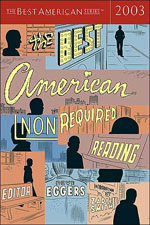[Transcribed discussion of “The Village of Butterflies,” by Stephanie Dickinson, published in Green Mountains Review.
In this story, an elderly Vietnamese-American woman is stranded in New Orleans just after Hurricane Katrina. While Lake Ponchartrain floods the city, the woman finds herself stuck on the roof of a van otherwise submerged. Hours pass, then days, and she becomes badly dehydrated. Delirious, the woman hallucinates scenes from her younger days when she still lived in Vietnam. This was during the Vietnam War. Her sister’s lover had died in the violence and the old woman re-experiences the day they got the news. She and her sister see a monkey in the treetops and her sister decides this monkey is her lover reincarnated. The sisters are horrified, however, to watch a group of U.S. soldiers shoot it for sport. Then – and the story shifts back to New Orleans – a crate floats up to the woman’s van. In it is a monkey just like the one she and her sister saw killed years ago. The woman makes it her mission, while trying to survive herself, to save this monkey.]
Bianca: This story grabbed me. I liked that it was written from an old woman’s point of view and that there was this connection between where she was and her past, her history.
Nick: For me, this story was about her personal journey. She’s trying to work out some serious issues with her past. And the story is her going on that journey. By helping the monkey she helps her sister. That’s why she sees her sister swimming behind her at the end.
[The woman and the monkey are eventually rescued. At the end of the story, the woman sees the ghost of her long-dead sister swimming behind the rescue boat.]
Joseph: This story kind of sounded like it was a translation. There were all these short sentences, like on page 110: “I have the fish in my fingers. Silvery, darker on its belly. I feel its fright, its terrified eye meeting mine. Its lips are fleshy.” Her descriptiveness is amazing. I know it wasn’t translated, but the short sentences make it sound like it was.
Paolo: The short sentences worked really well, I thought. She’s stranded on this van after a huge disaster and she’s deprived of water. Her thoughts would be short. So having the sentences be really short, too, helped me feel what she was feeling. And I loved all the dreamy parts about life in Vietnam. That added a lot of depth. There’s so much going on. I felt a lot in this story. When they come to rescue her at the end and it looks for a moment like they won’t take the monkey, I was really upset! Then they let her take it along and I thought, YES!
John: I agree. This story touches you on personal level.
Tenaya: It made me really love this old woman.
[The students were asked if they needed to know the history of the Vietnam War to enjoy the story.]
John: Not really. We haven’t studied the Vietnam War much in history class, but I could figure out what was going on in this story without that.
Ellen: I loved this story. And I don’t think you need to know a lot about the Vietnam War, no. This was one of my favorite things we’ve read. I thought the narration went really well. And the short sentences felt honest. There was an honesty to the way she wrote it. It flowed well. There weren’t any tricks in the writing, or long sentences that make your head spin. I enjoyed the way it jumped between New Orleans and Vietnam. It made figuring out what was going on a puzzle, but a fun puzzle. That’s actually what I liked most about it—fitting the pieces together.
Subscribe to:
Post Comments (Atom)









No comments:
Post a Comment